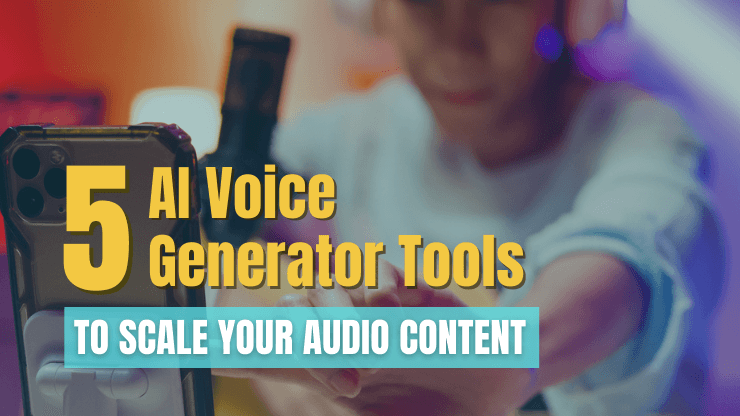AI-powered voice generation technology has the capability to transform written text into human-like speech and enhance customer experiences, boost accessibility and inclusivity, and help teams scale up their podcast and voice over content creation. In short, text-to-speech AI tools are redefining how businesses interact with their customers and audiences.
In this guide, we'll explore the key benefits these tools offer, introduce you to some of the leading text-to-speech AI tools in the market, and explain the myriad of ways your business can leverage this technology. By the end of this article, you’ll have the information you need to choose the best AI text to speech tool for your business.
How can businesses benefit from using AI-powered text-to-speech tools?
AI text-to-speech and synthesis tools utilize advanced artificial intelligence algorithms to synthesize human-like speech, enabling businesses to create realistic and engaging voiceovers, interactive voice assistants, and more. These tools offer a cost-effective and efficient way for businesses to generate high-quality, audio content tailored to their specific needs.
Key Benefits for Businesses:
- Tailored and personalized solutions: Companies can fine-tune voiceovers and voice assistants to cater to specific target audiences, enhancing customer engagement and satisfaction.
- Multilingual capabilities: AI-driven tools are often equipped to synthesize speech in multiple languages, allowing businesses to appeal to a diverse range of customers.
- Scalable output: AI voice generators can rapidly generate vast amounts of audio content, using a computer generated voice, effectively accommodating the expanding needs of businesses.
- Enhanced experiences: Text to speech AI tools can simulate natural sounding voices to enhance customer experiences and improve engagement on websites, apps, and chatbots.
- Improved accessibility: AI voice generators can produce a computer generated natural sounding voice to aid in the accessibility and inclusion for people with disabilities, language barriers, or low literacy levels by enabling them to access information through audio.
Top 5 AI voice generator and text to speech tools
Voice generators powered by AI can create realistic AI voices to aid in areas such as video voiceover creation, assisted website navigation, podcast creation, and more. But because there are a wide range of options on the market, choosing the best AI voice generator for your business can be a challenge. In this section we will provide you with a list of 5 of the best AI tools to help you narrow down the search scale for your audio content creation in 2023.
Descript Overdub
AI text-to-speech and AI voice generator tool that allows you to create a model of your own voice or select from stock voices to generate speech from text.
What you need to know:
- Podcast, transcription, and video editing tools are available as part of the full suite of Descript software to help teams repurpose content and create audio files for a wide range of applications
- Uses voice cloning technology to create a custom voice, based on your real voice
- Offers multiple versions of your own voice to reflect different emotional states or accents
Amazon Polly
Cloud service by Amazon Web Services that converts text into spoken audio and allows developers to create speech-enabled applications and products.
What you need to know:
- Uses deep learning technologies to make sure voices sound natural
- Supports multiple languages and includes a variety of lifelike voices.
- Offers a pay-as-you-go pricing model based on the number of characters of text that are processed by the AI voice generator
- Supports common SSML tags for phrasing, emphasis, and intonation
Resemble AI
AI voice generator that lets you create realistic AI voices or clone your voice for voice overs, videos, and more.
What you need to know:
- Allow you to clone your own voice or choose from over 200,000 AI voices in different languages and emotions.
- Voice generator can transform your voice into another voice with speech-to-speech technology.
- Features available to help you blend human and synthetic voices
VALL-E
Neural codec language model that can synthesize personalized speech from text and acoustic prompts.
What you need to know:
- Uses discrete codes derived from an off-the-shelf neural audio codec model, rather than continuous signal regression as in previous text-to-speech systems
- Can imitate any voice with just a three-second sample, as long as the voice matches one in the training data
- Can preserve the speaker's emotional tone and acoustic environment of the acoustic prompt in synthesis
Murf.ai
What it is: AI voice generator and text to speech software that lets you create studio-quality voice overs.
What you need to know:
- Offers over 120 AI voices in 20 languages and accents to suit your needs.
- Allows you to upload your videos, images, or music and sync them with the voice of your choice
- AI voice technology enables you to adjust the pitch, punctuation, and emphasis of the AI voices to capture the right tone and mood.
- Can transform your home recordings into professional voice overs with its AI voice changer feature
What are the main use cases for text to speech AI tools?
Text-to-speech AI tools have a wide range of use cases that can revolutionize various aspects of business operations and beyond. These applications include:
- Podcasts: Text-to-speech AI tools can convert written content into natural-sounding speech, enabling easy creation and distribution of podcasts, reaching a broader audience and enhancing content accessibility.
- Audio editing: These tools can be employed to generate voiceovers for videos, advertisements, or presentations, significantly streamlining the audio production process and reducing costs.
- E-learning and training: Text-to-speech AI can transform educational content into spoken form, making it more engaging and accessible for learners, especially those with visual impairments. It also allows for the creation of personalized learning experiences.
- Content marketing: By converting written content into audio, businesses can diversify their content marketing strategy, attracting new audiences and enhancing user engagement.
- Voiceovers: Text-to-speech AI is widely used in the entertainment industry for generating voiceovers for animations, video games, audiobooks, and more, saving time and resources compared to the cost and effort required to hire voice actors.
- Audiobooks: Converting written books into audiobooks expands the reach of literature and provides an additional format for people to enjoy books.
What are some best practices for using AI text to speech (TTS) tools?
Using AI text-to-speech tools can greatly enhance various processes, but it's essential to follow best practices to ensure optimal results and maintain ethical considerations. Here are some best practices for using AI text-to-speech tools:
- Choose the right tool: It is crucial to select a reputable AI text-to-speech tool that aligns with your business needs and objectives. Look for a tool that offers high-quality voices, as this will significantly impact how your content is received by the audience. Ensure that the tool supports the languages you require and is compatible with your platforms and applications. Consider the variety of voice options available and choose one that complements your brand image and resonates well with your target audience.
- Adjust speaking rate and tone: AI-generated voices may require adjustments to their speaking rate and tone to suit the specific context of your content. For marketing materials, you may want a more engaging and enthusiastic tone to capture the attention of potential customers. On the other hand, internal training content might demand a clear and professional tone for effective learning. Regularly evaluate user feedback and metrics to fine-tune the speaking rate and tone, ensuring it aligns with the preferences and expectations of your audience.
- Proofread and edit: While AI text-to-speech tools have come a long way in accuracy, they may still make occasional errors or mispronunciations. To maintain content quality and professionalism, always proofread and edit the generated audio. Review the script before producing the final audio and correct any mistakes or awkward phrasings. A human review step can help catch nuances or context-specific requirements that AI might struggle with, ensuring a more polished and refined output.
- Be mindful of accents and languages: Choose a voice that accurately pronounces regional variations to avoid miscommunications and potential offense to specific groups. Ensuring the AI tool handles industry-specific jargon or technical terms appropriately is also essential. Offering a seamless and culturally sensitive experience enhances user engagement and reflects positively on your brand.
- Respect copyright and usage rights: Adherence to copyright laws and usage rights is of utmost importance when using AI text-to-speech tools. Always obtain proper permissions before using third-party content as input for generating audio. For marketing purposes, avoid using copyrighted materials without proper authorization to prevent legal issues. Similarly, for internal training, ensure the content used is either created in-house or sourced from reputable providers with appropriate licensing.
Conclusion
AI-powered voice generation tools offer businesses the opportunity to revolutionize their audio content creation and customer interactions. With thoughtful implementation and adherence to best practices, AI text-to-speech tools can provide significant value to your business, ushering you into the future of audio content creation.
Our custom AI development company can help you put together a comprehensive AI strategy and help you leverage the power of AI to build custom software solutions that fit your unique business requirements. Don’t hesitate to reach out today.

